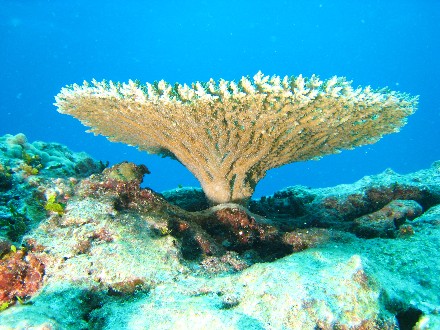Scientists have discovered a possible new painkiller inside a type of soft coral living on Green Island, a small volcanic peak just off the coast of Taiwan.
 Dr Zhi-Hong and colleagues from the National Sun Yat-Sen Univeristy in China have a paper in the British Journal of Pharmacology in which they test a compound called capnellene inside the Kenya Tree Coral (Capnella imbricata) - which look like little white trees. This molecule could prove a vital step forward for combating neuropathic pain.
Dr Zhi-Hong and colleagues from the National Sun Yat-Sen Univeristy in China have a paper in the British Journal of Pharmacology in which they test a compound called capnellene inside the Kenya Tree Coral (Capnella imbricata) - which look like little white trees. This molecule could prove a vital step forward for combating neuropathic pain.
People with Neuropathic pain suffer from intense pain from a stimulus that should normally only cause mild discomfort, like a cold draft. Some people even feel pain with no stimulus at all and it's a condition that may affect as much as 1 in 100 people in the UK alone. It can be triggered by nerve damage associated with diabetes and standard pain killers like aspirin are little help.
Inflammation of the nervous system plays an important role in causing neuropathic pain, by activating the cells that surround nerve cells, called microglia and astrocytes, and when they are active they magnify pain signals travelling along the nerves making the pain sensation more intense.
Capnellene was originally discovered in 1974 but only recently scientists began to realise how useful it might be. The molecule has a very different structure to other painkillers.
The research team tested out capnellene both on isolated nerve cells and also on laboratory rats, and found that it reduced pain-related activities in nerve cells and the rats that suffer from neuropathic pain showed fewer pain responses when they were given doses of the compound.
It may seem strange that a coral would have developed a pain killing chemical, but life on a coral reef is tough and competitive, with so many species living in close proximity, and many of them have evolved complex chemical defences to help give them the upper hand. It just happens that some of those active chemicals have affects on other types of animal.
It's early days, but this discovery does offer longterm hope for sufferers of neuropathic pain and points the way towards a new generation of pain killers, that are inspired by the sea.
- Previous Urgent need for soil maps
- Next Shrimp-shell biodiesel










Comments
Add a comment